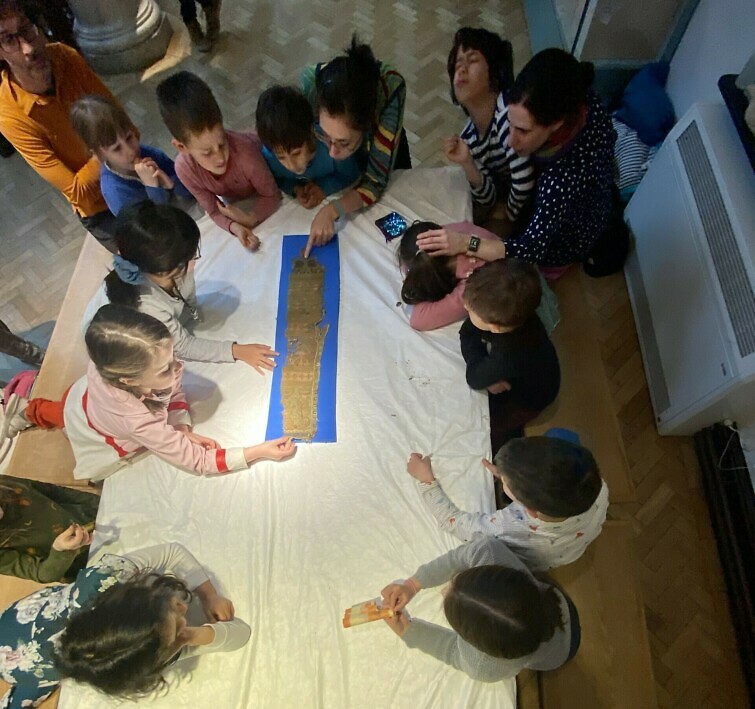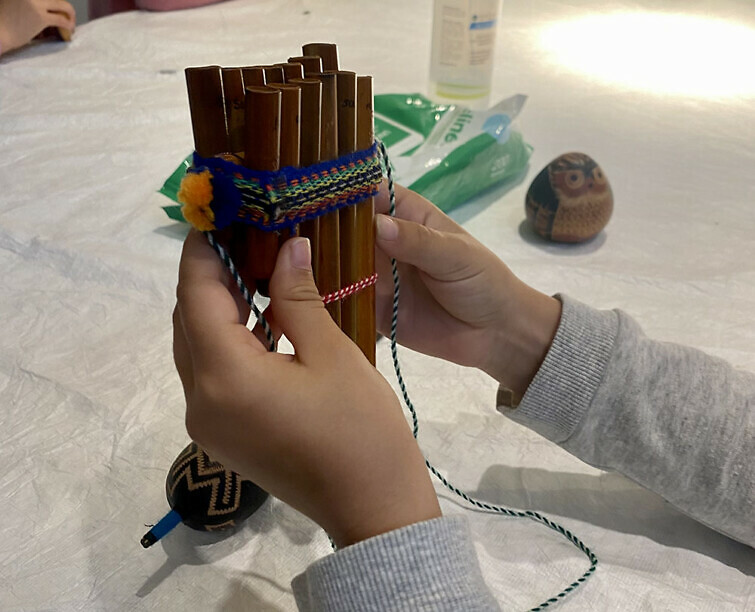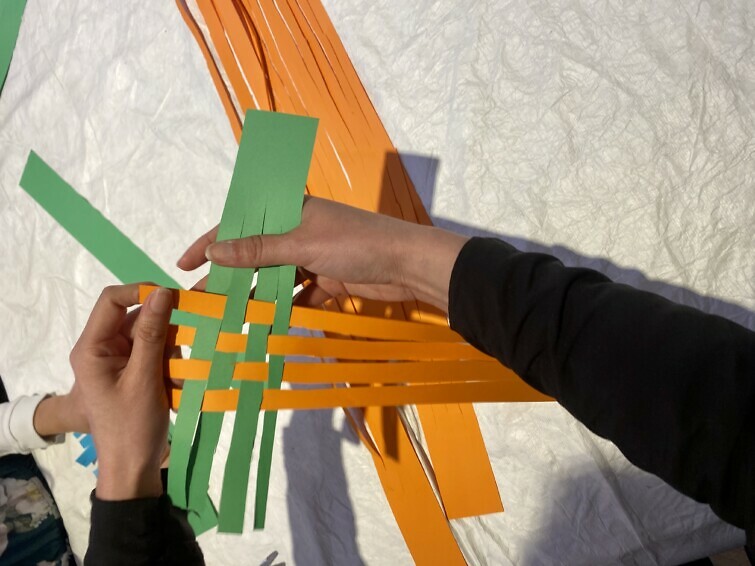In mid-April 2023, more than a dozen children from Escuelita, a Cambridge Spanish language school initiative, ages 4 to 11 (and their inquisitive parents and teachers) entered the Museum of Archaeology and Anthropology (MAA) to participate in the first ever targeted music, art, and craft of the Americas playshop, sponsored by the CRASSH Multidimensional Dialogues Research Network, the Americas Archaeology Group and the MAA and funding from the CRASSH Workshop grant and Centre for Language Sciences Impact Fund. The kids were there to explore the senses through acts of play to answer the question: how can today’s learners foster their connections to art, languages, and innovative scientific studies? The answer: playful discovery and immersive multilingual learning about the senses.
The event was the first portion of a two-part workshop programme for the 2023 Multicoloured and Melodious Dimensions of the Americas: Music, Colour, and Craft Playshop, co-convened by the CRASSH Multidimensional Dialogues (MD) research network (Camila Alday, Oliver Antczak, Joshua Fitzgerald, Jimena Lobo Guerrero Arenas, Chike Pilgrim, and Jasmine Vieri).
Workshop events relate to CRASSH MD’s 2023 Lent theme focusing on Phenomenological Studies of the Americas which featured specialists in Archaeology, History, and Anthropology from North, Central and South America. The goals are to expand the conversation beyond academic talks and encourage younger learners to explore the Americas’ heritage, objects and the Arts.

Escuelita students practised Spanish while playing, crafting, and decorating traditional instruments, learning how music and art once affected the senses of past peoples. Using their breath to pipe out a whistling Andean siku or drumming a quick tick-tock with a Mesoamerican teponaztli, they conveyed music’s value with resonating rhythms. Weaving strands of colourful paper modelled after an ancient Peruvian textile, the children compared materials and artistic choices, educating themselves and their peers on how traditional arts matter. As devised by the co-organisers and Escuelita Cambridge staff, the goals of the playshop included encouraging language development and increasing curiosity in archaeology and the history of art of the Americas. Based on participant reactions, the event surpassed those goals.

Guided by CRASSH MD team members—a cohort of archaeologists, historians, and heritage specialists—as well as a featured conversation with ethnomusicologist and sociologist Vanessa Paloma Duncan-Elbanz from the Department of Music in Cambridge, the playshop took place entirely in Spanish. The pedagogical approach was dynamic, with a display of authentic archaeological objects from the collection, hands-on study of objects from the MAA handling shelves to touch and play, Spanish text slides with key terms and questions and videos of performances by Indigenous musicians from Latin America. Additionally, Escuelita families and devoted educators had a guided tour of MAA’s exhibition COLOUR: Art, Science, and Power where they could also visualise the use of different colours in Peruvian textiles.
The most important takeaways from Part One included children sharing their thoughts and considerations of the past, languages and how the senses impact their lives. The event followed all MAA and Escuelita Cambridge safety and comfort guidelines to ensure the families felt welcomed and all had an enjoyable and respectful experience. Follow-up questionnaires for Escuelita teachers and reflective projects developed by the students will help to track the wider impact of the event, and an exciting Part Two also including Escuelita families but also the wider public is yet to come.
A mediados de abril de 2023, más de una docena de niños de entre 4 y 11 años pertenecientes a Escuelita Cambridge, una iniciativa para el aprendizaje del idioma Español, (y sus curiosos padres y maestros) visitaron el Museo de Arqueología y Antropología (MAA) para participar en un taller dedicado a la música, el arte y la artesanía de las Américas, patrocinado por la Red de Investigación de Diálogos Multidimensionales de CRASSH, el Grupo de Arqueología de las Américas y el MAA y financiado gracias a fondos CRASSH y el Centro para el Impacto de las Ciencias del Lenguaje. Los niños asistieron con el fin de responder a través del juevo y la exploración de los sentidos, a la pregunta: ¿cómo pueden los estudiantes de hoy fomentar sus conexiones con el arte, los idiomas, la ciencia y la innovación? La respuesta: a través del redescubrimiento lúdico y el aprendizaje multilingüe explorando los sentidos y lo que cada uno tiene para ofrecer.

El evento hace parte de un programa más amplio de actividades agendadas por la red de CRASSH Multidimensional Dialogues (MD) research network. Está actividad en particular está constituida por dos talleres a llevarse a cabo en 2023 como parte del programa que lleva por nombre Multicoloured and Melodious Dimensions of the Americas: Music, Colour, and Craft Playshop, co-organizado por los miembros de la red Camila Alday, Oliver Antczak, Joshua Fitzgerald, Jimena Lobo Guerrero Arenas, Chike Pilgrim, y Jasmine Vieri.
Las actividades del taller estuvieron vinculadas al tema que guió el periodo académico ‘Easter Term 2023’ el cual giró alrededor de los estudios fenomenológicos de las Américas, contando con especialistas en arqueología, historia y antropología de las Américas. Los objetivos fueron los de ampliar la conversación a otros públicos interesados, más allá del público académico y alentar a los estudiantes más jóvenes a explorar el patrimonio, los objetos y las artes en el continent.
Los estudiantes de Escuelita tuvieron la oportunidad de practicar Español mientras tocaban, fabricaban y decoraban instrumentos tradicionales, aprendiendo cómo la música y el arte también afectaron los sentidos de los pueblos del pasado. Los estudiantes intentaron reproducir un siku andino y tocar un teponaztli mesoamericano, transmitieron el valor de la música con ritmos resonantes. Tejiendo hebras de papel de colores siguiendo el modelo de un antiguo tejido peruano, los niños compararon materiales y opciones artísticas, educándose a sí mismos y a sus compañeros sobre la importancia de las artes tradicionales. Tal como fue ideado por los coorganizadores y el personal de Escuelita Cambridge, los objetivos del taller de juegos incluían fomentar el desarrollo del lenguaje y aumentar la curiosidad por la arqueología y la historia del arte de las Américas. Según las reacciones de los participantes, el evento superó esos objetivos.
Guiado por los miembros del equipo de CRASSH MD, una cohorte de arqueólogos, historiadores y especialistas en patrimonio, así como una conversación destacada con la etnomusicóloga y socióloga Vanessa Paloma Duncan-Elbanz del Departamento de Música de Cambridge, [detalles], el taller de teatro se llevó a cabo en su totalidad. en español. El enfoque pedagógico fue dinámico, con una exhibición de objetos arqueológicos auténticos de la colección, estudio práctico de objetos de la MAA manipulando estantes para tocar y jugar, diapositivas de texto en español con términos clave y preguntas y videos de actuaciones de músicos indígenas de América Latina. America. Además, las familias de Escuelita y los educadores dedicados tuvieron una visita guiada a la exposición COLOR: Arte, Ciencia y Poder de MAA, donde también pudieron visualizar el uso de diferentes colores en los textiles peruanos.
Los aprendizajes más importantes de la primera parte incluyeron a los niños compartiendo sus pensamientos y consideraciones sobre el pasado, los idiomas y cómo los sentidos impactan sus vidas. El evento siguió todas las pautas de seguridad y comodidad de MAA y Escuelita Cambridge para garantizar que las familias se sintieran bienvenidas y que todos tuvieran una experiencia agradable y respetuosa. Los cuestionarios de seguimiento para los maestros de Escuelita y los proyectos reflexivos desarrollados por los estudiantes ayudarán a rastrear el impacto más amplio del evento, y aún está por llegar una segunda parte emocionante que también incluye a las familias de Escuelita, pero también al público en general.

